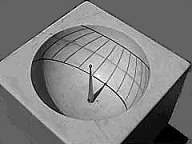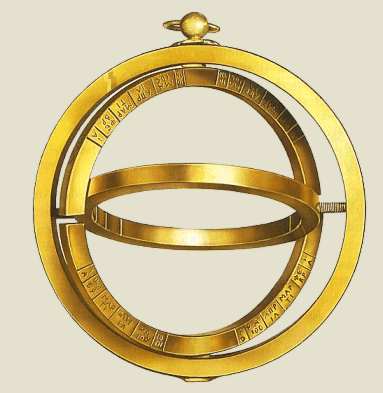.
Part 2
The Enigma of Cleobulina the daughter of Cleobulus: A father had 12 children, and these 12 chldren had each 30 white sons and 30 black daughters which are immortal though they died every day.
Time Measurements
I will provide soon information about the units of time used by ancient Greeks. Only some funny remarks at the moment is that ancient Greeks used also in principle liquid measures for time measurements since as we know time “flows”. Using the clepsydra as a clock one could define the time by the amount of water that is required to empty a filled container with a hole in the bottom that allowed the water to escape which is approximately 4 minutes for 3 liters.
Using also the shadow length it was common for ancient Greeks to say that they will meet at a specific time that is given as the length of a shadow shown by a sundial. In Aristophanes' Ecclesiazusae, in the 4th century BC, a person says that he determines dinner time by the length of a gnomon's shadow.
SUN dials
Greek scaphe dial

The scaphe dial, probably the oldest form of sundials. Scaphe (Greek boat) a bowl-shaped cup within which the hour-lines are marked. At the time of summer solstice the shadow is shortest and falls exactly on the bottom line. In the following time the shadow grows again until it reaches the top line at the time of winter solstice. The days are divided into temporal hours. Their length is not fixed but instead the time between sunrise and sunset is divided into 12 intervals of equal length.
Universal Ring dial

Parmenio of Macedonia constructed the Philippi sundial a portable clock that was also an astronomical instrument. It was used to measure approximate latitude, azimuth and zenith in the distances of the stars. Its diameter was 7cm and a model was discovered by the Greek archaeologist Stylianos Pelekanidis in the Philippi of Macedonia in 1965. It was built in Alexandria and it is mentioned by Vitruvius who also describes other sundials (Sundials in Greece ) http://www.tmth.edu.gr/videos/sundial.ram A Real Audio Video (In Greek)
The Hemicyclium of Berosus
The Hemispherium of Aristarchus
The Discus on a Plane of Aristarchus
The Arachne of Eudoxus
The Plinthium of Scopas
The Universal Dial of Parmenio
The Universal Dial of Theodosius and Andrias
The Peliconon of Patrocles
The Cone of Dionysidorus
The Quiver of Apollonius
Digital Simulation of the Kourion Sundial
Months: 12 a- 30(or 29) days (with a periodic intercalation of a thirteenth month every 2 years )
Names of Months in Greece
|
Period |
Attica (Month of) |
Sparta |
Boetia |
Delphi |
Crete |
|
December-January |
Gamelion |
? |
Hermaios |
Amalios |
Agyios |
|
January-February |
Anthesterion |
Eleusinios |
Prostaterios |
Bysios |
Dioskouros |
|
February-March |
Elaphebolion |
Gerastios |
Agrioaios |
Theoxenios |
Theodosios |
|
March-April |
Munychion |
Artemisios |
Thioyios |
Endyspoetropios |
Pontos |
|
April-May |
Thargelion |
Delhinios |
Homoloios |
Herakleios |
Rabinthios |
|
May-June |
Skirophorion |
Fliasios |
Theilouthios |
Ilaios |
Hyperberetos |
|
June-July |
Hekatombion |
Hekatombeus |
Ippodromios |
Apellaios |
Nekysios |
|
July-August |
Metageitnion |
Karneios |
Panamos |
Boukatios |
Basileios |
|
August-September |
Boedromion |
Panamos |
Pamboiotios |
Boathoos |
Thersmofhorion |
|
September-October |
Pyanepsion |
Herasios |
Damatrios |
Heraios |
Hermaios |
|
October-November |
Maimakterion |
Apellaios |
Alalkomenios |
Daidophorios |
Metarhios |
|
November-December |
Poseidon |
Diosthios |
Boukatios |
Poetropios |
Eiman |
Plutarch discusses the etymology of the Delphic name Bysios. He concludes that it is derived from Pythios (Apollo). He was born the 7th Bysios and it was only this one day of the year where the Oracle of Delphi answered questions (at least in the early days according to Alexandrides and Callisthenes).. Later the Oracle answered questions every month (I guess for financial reasons)
|
Month |
Rhodes |
Epidaurus |
Macedonia |
Delos |
Bithynia |
|
December-January |
Pedageitnios |
Posidaios |
Audnaios Αυδναίος or Αυδηναίος |
Lenaion |
Herakleios |
|
January-February |
Badromios |
Artamitios |
Peritios Περίτιος |
Hieros |
Dios |
|
February-March |
Sminthios |
Agrianios |
Dystros Δύστρος |
Galaxion |
Vendidaios |
|
March-April |
Artamitios |
Panamos |
Xanthikos (1) Ξανδικός or Ξανθικός + 6 times every in a 19-years cycle included Xandikos Embolimos, Ξανδικός Εμβόλιμος ) |
Artemision |
Strateios |
|
April-May |
Agrianios |
Kyklios |
Artemisios Αρτεμίσιος or Αρταμίτιος |
Thargelion |
Periepios |
|
May-June |
Hyakinthios |
Apellaios |
Daisios Δαίσιος |
Panamos |
Areios |
|
June-July |
Panemos |
Azosios |
Panemos Πάνημος or Πάναμος |
Hekatombaion |
Afrodisios |
|
July-August |
Karneios |
Karneios |
Loios Λώιος |
Metageitnion |
Dimitrios |
|
August-September |
Dalios |
Proratios |
Gorpaios Γορπιαίος |
Bouphonion |
Heraios |
|
September-October |
Thesmophorios |
Hermaios |
Hyperberetaios Υπερβερεταίος + every 19 years additional month Hyperberetaios Embolimos Υπερβερεταίος Εμβόλιμος |
Apatourion |
Hermaios |
|
October-November |
Diosthyos |
Gamios |
Dios Δίος |
Aresion |
Mitroos |
|
November-December |
Theudaisios |
Teleos |
Apellaios Απελλαίος |
Poseideon |
Dionysios |
(1) Festival Xanthika
|
Month |
Cyprus |
Sicily |
Milet |
Aetolia |
|
December-January |
Kaisarios |
Agrianeios |
Lenaion |
Euthiaios |
|
January-February |
Sebastos |
? |
Anthesterion |
Homoloios |
|
February-March |
Autokratorikos |
Theudasios |
Artemision |
Hermaios |
|
March-April |
Dimarhexousios |
Artamitios |
Taureon |
Dionysios |
|
April-May |
Plithipatos |
? |
Thargelion |
Agyieos |
|
May-June |
Arhiereus |
Badromios |
Kalamaion |
Hippodromios |
|
June-July |
Esthios |
Yakinthios |
Panemos |
Laphraios |
|
July-August |
Romaios |
Karneios |
Metageitnion |
Paaamos |
|
August-September |
Afrodisios |
Panamos |
Boedromion |
Prokuklios |
|
September-October |
Apogonikos |
Thesmoforos |
Pyanopsion |
Athanaios |
|
October-November |
Ainikos |
Dalios |
Apatourion |
Boukatios |
|
November-December |
Ioulios |
? |
Poseideon |
Dios |
The intercalary month usually came after Poseidon, and was called second Poseidon. For Athens the summer was the start of the year (the Hekatombion), other Greek cities states used a different start for their year (e.g., Sparta and Macedonia in fall, Delos in the winter). Changes by Meton to correct for the problem that this system has 750 days in 2 years compared to our 730 days today. The names of this list marked in red are from a Greek book which probably contains erroneously a shift of one month (for example using Plutarch's information about Alalkomenios that is the analog of Maimakterion in Attica ) and are used only to give an idea of the names used in various Greek cities. The most certain calendar is that of Athens. I cannot imagine how such a system could work today if we used also local names for the months. http://www.polysyllabic.com/Greek.html
The first day of a month is called Noumenia ( “new month”). Analyzing some sources it seems that the Greek calendar was actually more complex and different types were also used (for example the kata selenes calendar). Calenders proposed by Astronomers's such as Meton of Athens and others more accurate were not generally adopted, probably because there was no need for common people in contrast to astronomers.
The Athenian Calendar from 776 BC until today and even up to the 1000th Olympiad (c. 3221 AD)
|
Names of Attic Months |
|
Gamelion (Time of weddings) |
|
Anthesterion (Flower time, flower festival) |
|
Elaphebolion (Time of deer hunting) |
|
Munychion (Time of the Munychian Artemis festival) |
|
Thargelion (a festival for Apollo and Artemis) |
|
Skirophorion (Parasol bearers festival of Athena) |
|
Hekatombion (Time to offer the hecatombs) |
|
Metageitnion (Time where people flit and change neighbours) |
|
Boedromion (in memory of the conquest of the Amazons by Theseus) |
|
Pyanepsion (from a dish of beans eaten at a festival) |
|
Maimakterion (from Zeus Maimactes (the boisteous) |
|
Poseidon |
As Herodotus writes: I put the boundary of human life at seventy years. These seventy years have twenty-five thousand two hundred days, not counting the intercalary month; but if every other year be lengthened by a month so that the seasons come out right, these intercalary months in seventy years will be thirty-five, and the days for these months ten hundred and fifty. So that all the days of a man's life are twenty-six thousand two hundred and fifty (26250 days)...
Other Calendars
Images
Links
Palamedes, The mythical Origin of Greek measurements and weight units
SURVEYING AND ENGINEERING IN ANCIENT ROME
http://www.database.com/~lemur/rb-rolling-ball.html
Ancient Egyptian Calendar
More Information about Calenders
Pheidon of Argos The 'invention' of weights: A compilation of source material
Miscellaneous
References
Robert Hannah, Greek and Roman Calendars: Constructions of Time in the Classical World. London: 2005.ISBN 0-715-63301-5.
M. J. T. Lewis, Surveying Instruments of Greece and Rome,Cambridge University Press, 2001, 410 pages, 100 figures, ISBN: 0521792975
Andrι Wegener Sleeswyk, "Vitruvius' Odometer", Scientific American October 1981
Dieter Lelgemann, Recovery of the Ancient System of Foot/Cubit/Stadion – Length Units (PDF File) with some interesting ideas about Greek units and their relation to Egyptian units and to astronomical lenghts.
Ancient Greek texts on measurement Preliminary version
| Ancient Greece
Science, Technology , Medicine , Warfare, , Biographies , Life , Cities/Places/Maps , Arts , Literature , Philosophy ,Olympics, Mythology , History , Images Medieval Greece / Byzantine Empire Science, Technology, Arts, , Warfare , Literature, Biographies, Icons, History Modern Greece Cities, Islands, Regions, Fauna/Flora ,Biographies , History , Warfare, Science/Technology, Literature, Music , Arts , Film/Actors , Sport , Fashion --- |

